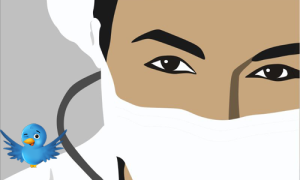
The reasons why healthcare professionals should use Twitter for career purposes has been a highly debated topic for a few years now. Perhaps the most common reason healthcare professionals are migrating towards Twitter is because of its global networking ability. Through Twitter, you can connect seamlessly with colleagues, patients and other medical professionals. People who you otherwise wouldn’t likely have the opportunity to connect with are suddenly accessible through Twitter. Below is a list of twitters benefits to healthcare .
-Physicians, healthcare marketers, and hospitals are all using Twitter as a means of establishing themselves as authorities in the healthcare field. Whether it’s engaging with other experts in the field, or creating captivating content, Twitter is being used to put an authoritative stamp on things.
-The healthcare community is using Twitter to inform, connect, and to help.
-Twitter is being used to open up dialogue throughout the healthcare community. Patients are able to shoot one off questions to their healthcare providers about aliments and receive feedback from medical staff in the blink of an eye.
-Physicians and hospitals are able to educate their communities about an infinite number of topics.
-Using Twitter as a tool to influence other users is one of the platforms many uses.
-The healthcare sector does a great job using Twitter to market a variety of things. Physicians use the platform to notify patients of new deals they may be running through their plastic surgery practice; medical marketers utilize the Twitter platform to market their newest eBook. Marketing comes in all different forms, and 140 characters is one of them.
However we should always remember that twitter is to be used as a tool. It should never be used as a supplement for medical advice or a medical diagnosis. With more and more experts of the healthcare community becoming involved on Twitter and other social media platforms, users are able to connect with much richer content.
Hi ! Interesting points in your article. I have yet to use the popular “trick” of numbering items in my title and in my article as a way of attracting more readers, but I think I will do that next time and see how it works. One comment I have for you is that it may help to actually number the points you are making to align more with the way you present the “6 ways” in the title. For instance 1., 2., etc..
Another trick I found useful in other blogs I have been researching throughout this course, is to provide a quick title for each of the points you enumerate. In this way, you can give someone the benefit of skimming your article and getting the gist of all your main topics, and if they interested they can continue to read the description below. This is particularly useful for me when I want to read articles for health, but don’t have time to read them in their entirety.
Hi there! I pretty much agree with Jennifer on all accounts — your title is great and catchy. People are suckers for lists.
I also agree that numbering the 6 ways would be helpful. I know that when I click on an article “top 11 ways that……”, if it’s a particularly long article, I usually scroll down to find the numbered sections, just to see what the 11 ways are. It helps a lot to have them bolded and numbered, and even increased in font size to really stand out. I also suggest maybe giving an example, with links, of each “way”. For example, for point #1, I’d love to see an example of a physician “establishing themselves as authorities in the healthcare field”, because I have no idea how someone would do that with 140 characters :] Still, great job!
Hi a good and an easy way of informing the readers the use of Twitter in healthcare. I like this numbering method a lot since it makes a lot easier for the readers to understand the articles. Good post.
Really helpful to see some surprising, and not self-evident ways Twitter is being used in this setting, and might help provoke a lively dialogue about it! What would help strengthen your post and provide healthcare professionals some greater insight into the how, and the “why” this can matter are providing particularly salient case examples with links as Amanda noted. Thanks for unpacking these benefits!